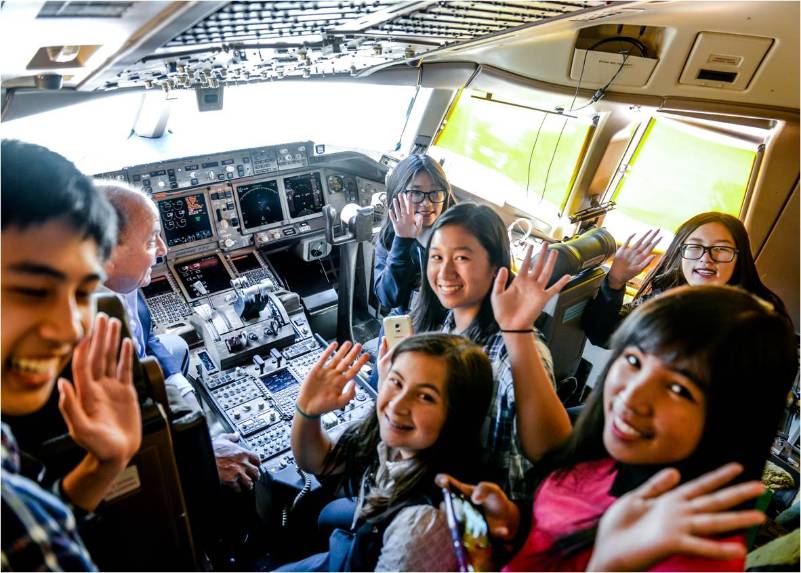Supporting K-12 Education
SJSU faculty and staff are sharing rich professional development opportunities and rigorous curriculum designs with local K-12 educators. These partnerships contribute to academic success, open doors to applied learning, and introduce students to the world of work. Thanks to these dedicated Spartans, Silicon Valley’s underserved students will be better prepared for college.
Katya Aguilar, Mark Felton
 Katya Karathanos Aguilar and Mark Felton share a commitment to advancing academic
literacy for English learners. In creating the Trio project these professors have
built a consortium between SJSU, partner school districts and local schools, one where
shared knowledge between new and veteran teachers supports the academic needs of high-school-age
English learners.
Katya Karathanos Aguilar and Mark Felton share a commitment to advancing academic
literacy for English learners. In creating the Trio project these professors have
built a consortium between SJSU, partner school districts and local schools, one where
shared knowledge between new and veteran teachers supports the academic needs of high-school-age
English learners.
“What is unique about our program is that our ‘clinical residency teams’ consist of one SJSU student teacher, a veteran mentor teacher, university supervisors, and content-area facilitators, working together to advance academic language development,” explains Aguilar. “Our student teachers bring the latest research and strategies they have acquired in SJSU’s student teaching program to the partnership, and the mentor teachers at the high schools share their classroom expertise.”
The resulting teams jointly participate in university-based professional development and instructional coaching that is aligned with school district curriculum. The trio then coplan and implement curriculum, observe one another’s lessons, and map student progress.
“It is a collaborative learning process for beginning and veteran teachers,” adds Felton. “The program richly enhances teachers’ professional skills, but ultimately benefits the students."
Grant Funding: U.S. Department of Education
Ferdinand Rivera
Ferdinand Rivera’s partnership with the Franklin-McKinley Union School District (FMSD)
has resulted in a rigorous math curriculum that engages 3rd to 6th grade students,
particularly those who are English learners. Putting the program into place are teams
of SJSU student teachers and veteran FMSD teachers. They have implemented data-driven
instructional plans that incorporate Rivera’s research on integrating mathematics
instruction with literacy.
“My research is about mathematical curriculum changes that impact underrepresented
minority students,” Rivera explains. “Whenever I develop research problems that affect
students, I take into account the issues they have with academic language and connect
them with math. One cannot separate English-learner needs and mathematical content
needs.”
Rivera’s research specifically focuses on the acquisition of algebra skills, and teaching algebraic concepts in the early grades. “There is a strong correlation between algebra performance in the early grades and later success in high school, college, and careers.”
Grant funding: National Science Foundation
Susan Arias, Elaine Collins
 The SJSU Mathematics, Engineering, Science Achievement (MESA) program introduces educationally
disadvantaged and first-generation middle- and high-school students to science, technology,
engineering and mathematics (STEM) careers using a combination of school site programs,
activities at SJSU, and visits to technology partner sites like NASA, IBM, and GE.
The SJSU Mathematics, Engineering, Science Achievement (MESA) program introduces educationally
disadvantaged and first-generation middle- and high-school students to science, technology,
engineering and mathematics (STEM) careers using a combination of school site programs,
activities at SJSU, and visits to technology partner sites like NASA, IBM, and GE.
“When kids use math and science to build something tangible, they find the subjects to be compelling and fun,” explains Director Susan Arias, who works with College of Science Associate Dean Elaine Collins to administer the program.
MESA-trained teachers also introduce the students to the college admission process, and working Silicon Valley engineers and scientists take part in their projects and events.
“Our goal is to increase the number of historically underrepresented K-12 students studying STEM subjects in college,” says Collins. “We want them to earn STEM degrees so that they can work in those professions in Silicon Valley.”
Grant funding: University of California
Karen Philbrick & MTI
 According to a joint report released by the U.S. Departments of Labor, Education,
and Transportation, 4.6 million transportation workers will be needed between 2012
and 2022 to fill vacancies in the workforce. SJSU’s Mineta Transportation Institute
(MTI), in the Lucas College and Graduate School of Business, is addressing this need
in a practical way: by introducing high school students to careers in the industry
through the Summer Transportation Institute (STI).
According to a joint report released by the U.S. Departments of Labor, Education,
and Transportation, 4.6 million transportation workers will be needed between 2012
and 2022 to fill vacancies in the workforce. SJSU’s Mineta Transportation Institute
(MTI), in the Lucas College and Graduate School of Business, is addressing this need
in a practical way: by introducing high school students to careers in the industry
through the Summer Transportation Institute (STI).
"Developing a robust workforce starts with educating young citizens about transportation careers. To that end, we founded the MTI Summer Transportation Institute,” explains MTI Executive Director Karen Philbrick.
The institute consists of three weeks of classroom study at SJSU, augmented by work-based learning experiences. A job-shadowing field trip to United Airlines at SFO introduced the students to careers in air traffic control, piloting, baggage handling and security. Participants also earned three units of college credit from SJSU’s Department of Environmental Studies.

The STI program will be offered again in Summer 2017. Interested high school students can contact MTI Director of Research and Technology Transfer Hilary Nixon (hilary.nixon@sjsu.edu) for more information.
Grant funding: U.S. Department of Transportation, University Transportation Centers Program (grant number DTRT12-G-UTC21)
SJSU Research Foundation Annual Report 2016-17